外研版必修4 Module 6 Unexplained Mysteries of the Nature World Listening and Vocabualry课件(共34张PPT)
文档属性
| 名称 | 外研版必修4 Module 6 Unexplained Mysteries of the Nature World Listening and Vocabualry课件(共34张PPT) |
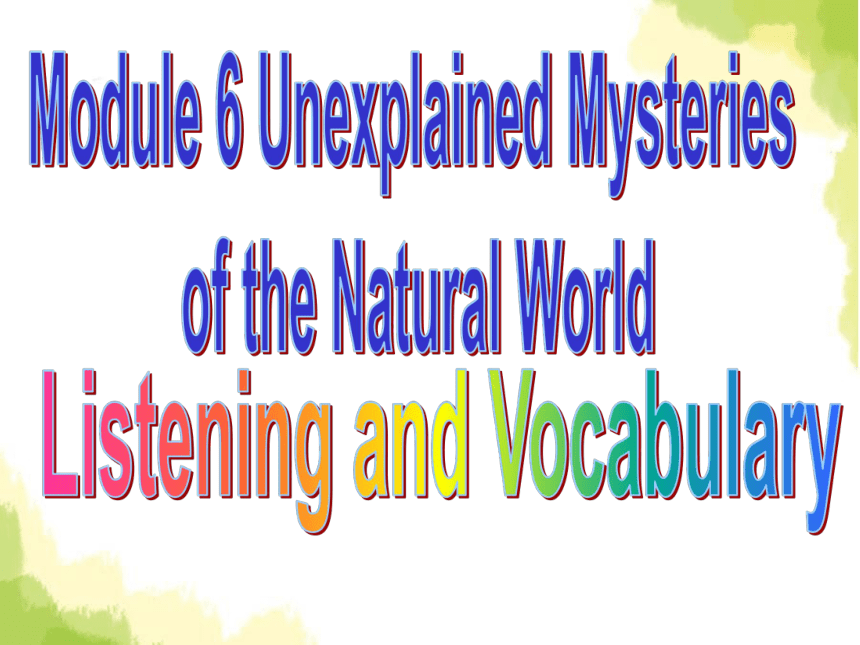
|
|
| 格式 | zip | ||
| 文件大小 | 2.4MB | ||
| 资源类型 | 教案 | ||
| 版本资源 | 外研版 | ||
| 科目 | 英语 | ||
| 更新时间 | 2018-12-03 00:00:00 | ||
图片预览

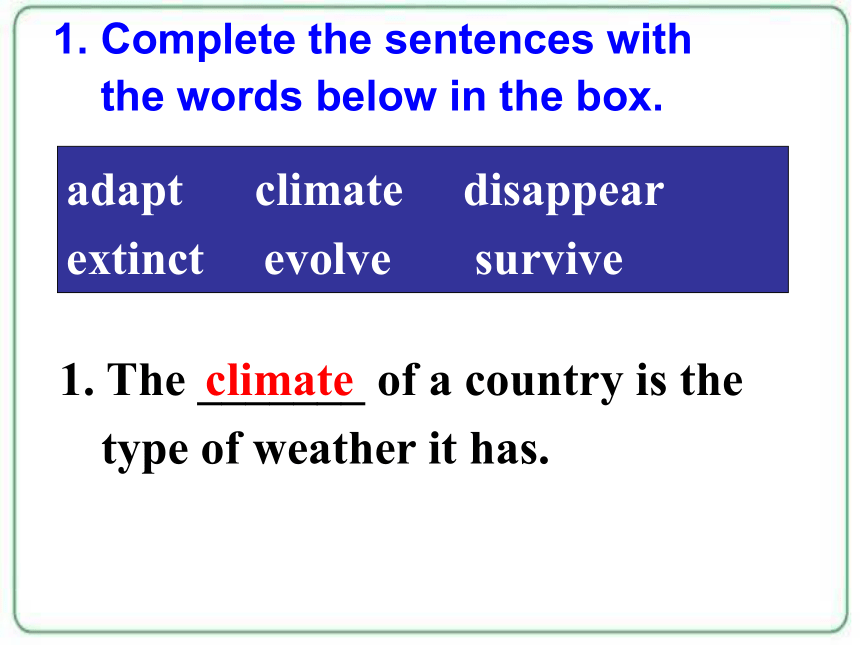

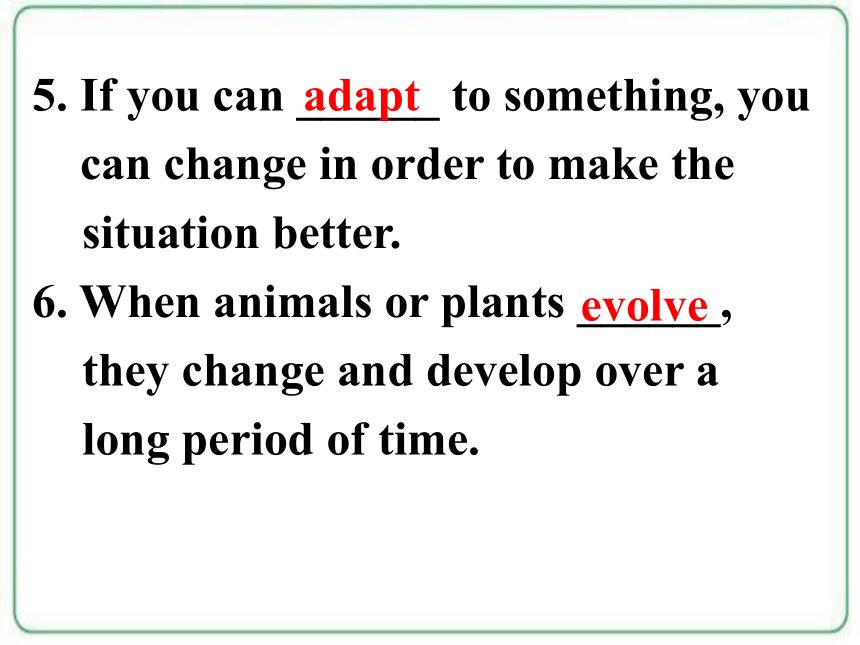

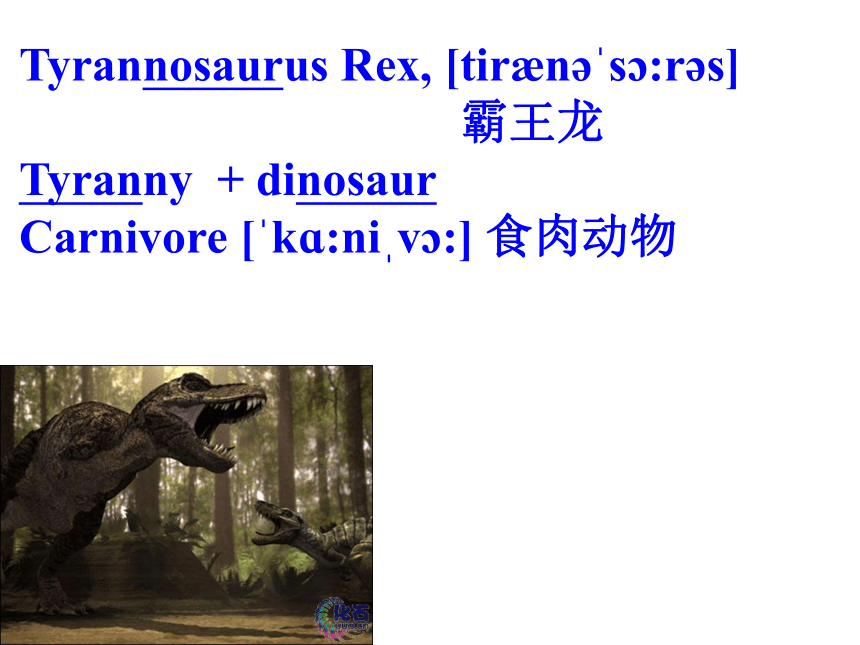
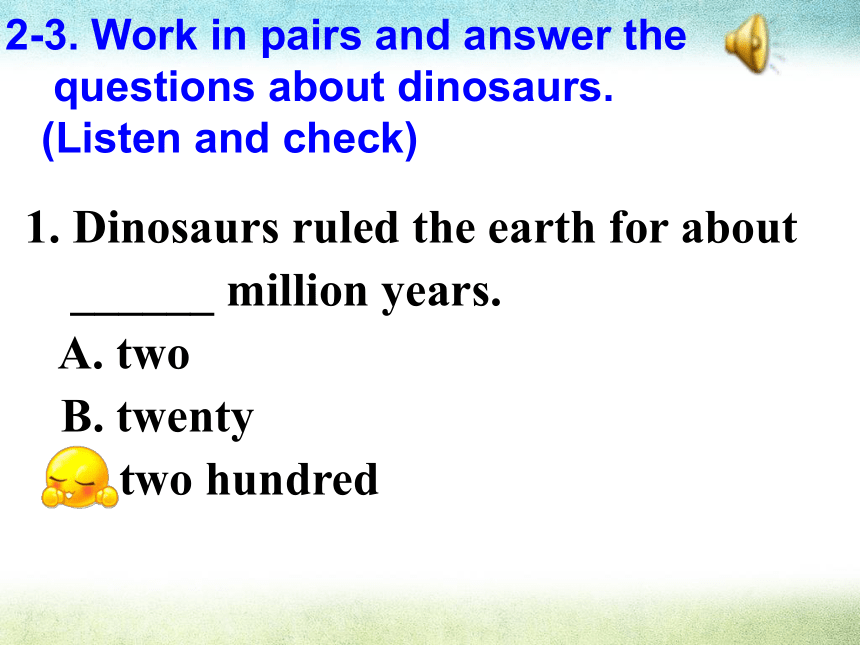
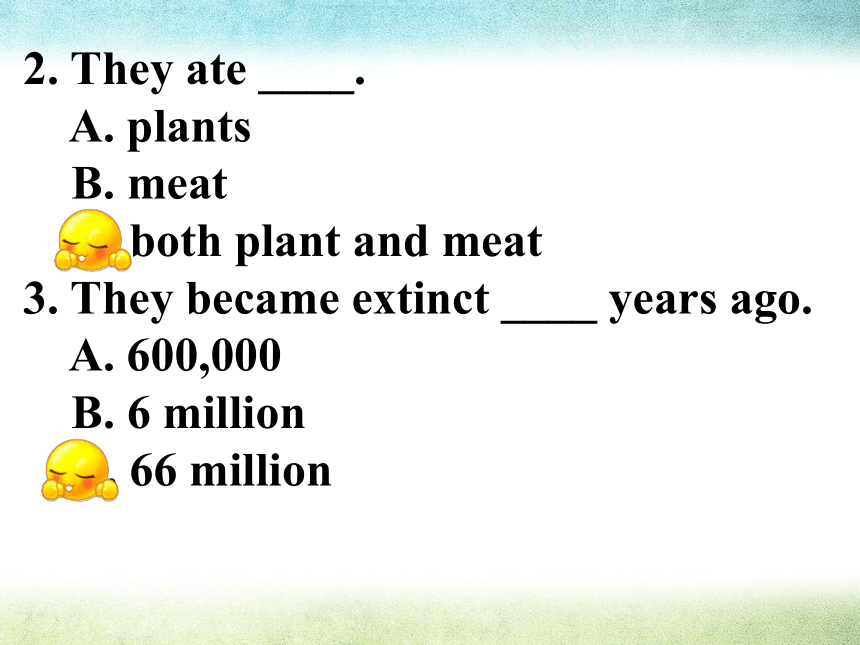
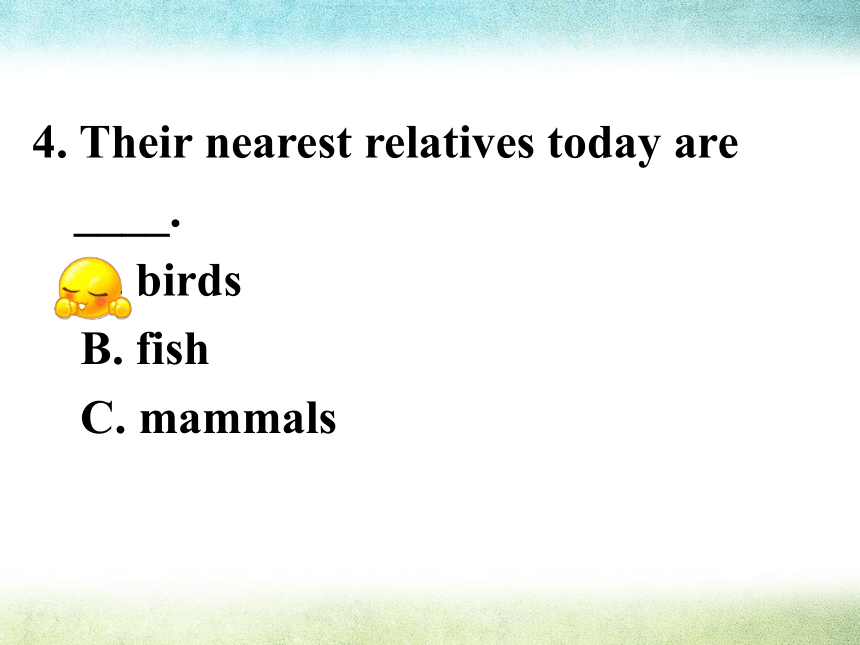
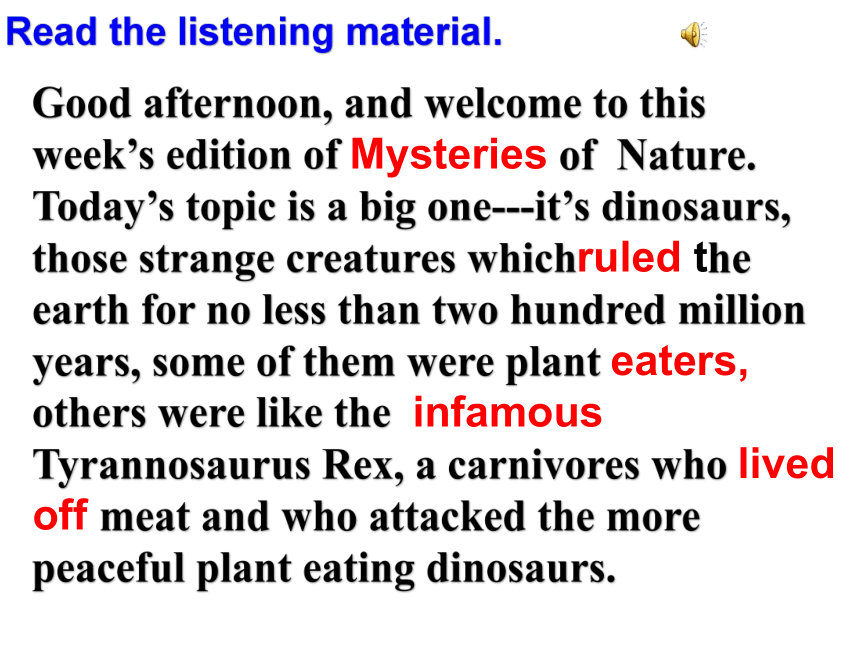
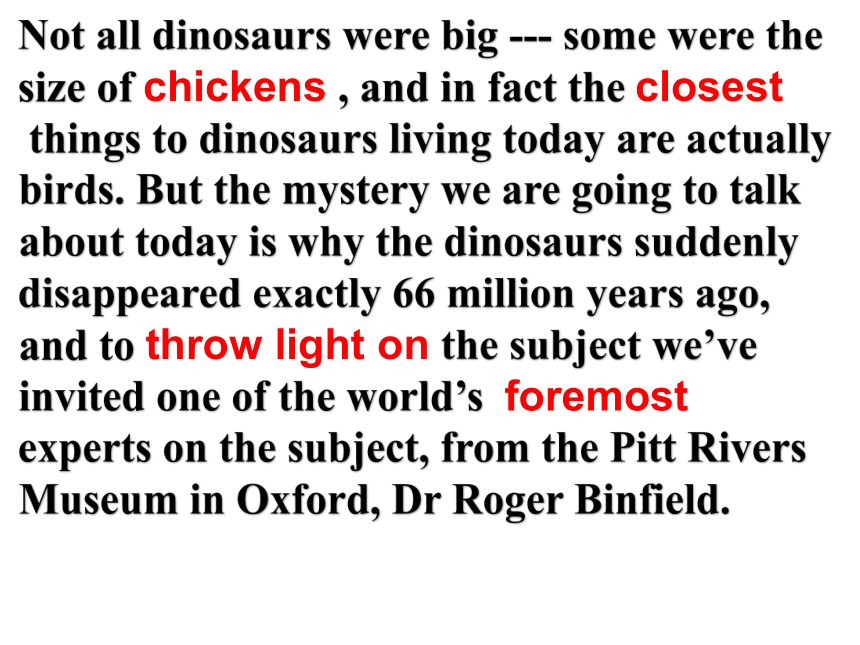

文档简介
课件34张PPT。Listening and VocabularyModule 6 Unexplained Mysteries
of the Natural Worldadapt climate disappear
extinct evolve survive1. The _______ of a country is the type of weather it has. climate1. Complete the sentences with
the words below in the box.2. If an animal or plant is ______, it existed a long time ago but doesn’t exist now.
3. When things _________, they no longer happen or exist.
4. When people or animals _______, they don’t die after an accident or an illness.extinctdisappear survive5. If you can ______ to something, you
can change in order to make the situation better.
6. When animals or plants ______, they change and develop over a long period of time.adaptevolveBefore ListeningTyrannosaurus Rex, [tir?n??s?:r?s]
霸王龙
Tyranny + dinosaur
Carnivore [?kɑ:ni?v?:] 食肉动物2-3. Work in pairs and answer the
questions about dinosaurs.
(Listen and check)1. Dinosaurs ruled the earth for about ______ million years.
A. two
B. twenty
C. two hundred2. They ate ____.
A. plants
B. meat
C. both plant and meat
3. They became extinct ____ years ago.
A. 600,000
B. 6 million
C. 66 million4. Their nearest relatives today are ____.
A. birds
B. fish
C. mammalsRead the listening material.Good afternoon, and welcome to this week’s edition of Mysteries of Nature. Today’s topic is a big one---it’s dinosaurs, those strange creatures whichruled the earth for no less than two hundred million years, some of them were plant eaters, others were like the infamous Tyrannosaurus Rex, a carnivores who lived off meat and who attacked the more peaceful plant eating dinosaurs. Not all dinosaurs were big --- some were the size of chickens , and in fact the closest
things to dinosaurs living today are actually birds. But the mystery we are going to talk about today is why the dinosaurs suddenly disappeared exactly 66 million years ago, and to throw light on the subject we’ve invited one of the world’s foremost
experts on the subject, from the Pitt Rivers Museum in Oxford, Dr Roger Binfield. Listening 2
How did dinosaurs disappear?Before listening: Guess the Chinese meaning of the words according to the pictures.volcanic eruption craterdust cloud nuts seeds galaxy meteorite4. Listen to the second part and tell how
many explanations are given for the
disappearance of the dinosaurs?Key:1. A meteorite hit the earth.2. They stopped evolving.3. They killed each other.4. A volcanic eruption.5. Cancer caused by radiation.Listen to the second part again. Tick the key words and phrases when you hear them.meteorite
[?miti??ra?t]
crater
[?kreit?]nuts and seedsgalaxy [?ɡ?l?ksi]volcanic eruptiondust cloud123456A huge meteorite may have hit all the dinosaurs. ( )
2. Perhaps a dust cloud made the world dark. ( )
3. A meteorite caused a volcanic eruption. ( )FTF6. Decide whether the statements
are true (T) or false (F).4. The dinosaurs had to eat seeds and
nuts to survive. ( )
5. Perhaps too much fighting caused the dinosaurs to die out. ( )
6. One scientist believes the dinosaurs
became ill when they ate the wrong food. ( )FTF7. There may be dinosaurs today living in other galaxies. ( )
8. Dr Binfield thinks the crater near Mexico was caused by a meteorite.
( )FTPresenter:Good afternoon Dr Binfield,
and welcome to the programme.
Dr?Binfield:Thank you.
Presenter:I'm going to come straight to
the point, even if I think there's not
going to be an easy answer: why did
the dinosaurs suddenly disappear,
almost overnight, 66 million years ago?
Dr Binfield: You're right. There's no easy answer to that question, but there are lots of theories.Presenter: Such as?
Dr Binfield: Well, probably the most
widely accepted theory is the
meteorite one...
Presenter: You mean the earth was
hit by a meteorite from space?
Dr Binfield: Yes, that's right.
Presenter: And the dinosaurs died
immediately?Dr Binfield:Not exactly, not all of them.
The meteorite may have hit the earth
with such force that it created a huge
dust cloud, which stopped the sunlight
from getting through... so there was no
light, no heat, and no food.
Presenter:But other animals survived?
Dr Binfield:Yes, smaller creatures like
mammals, which may have survived
because they ate nuts and seeds.
Presenter:What other theories are there?
Dr Binfield:Lots. The dinosaurs may have stopped evolving, and been unable to adapt to changes in the climate. Or they might all have killed each other.
Presenter:Is that possible?
Dr Binfield: Oh yes. They spent a lot of time fighting. There again, it might have been volcanic eruptions, not a meteorite, which sent up clouds of dust and cut off the light. One very recent theory says they died of cancer.
Presenter: Cancer? You mean the dinosaurs died out because they fell ill?
Dr Binfield: Yes. As a result of radiation coming from a dying star somewhere in our galaxy...
Presenter: That sounds fantastic.
Dr Binfield: Well, I think it's unlikely, but it's not impossible.
Presenter: Which theory do you believe?
Dr Binfield: I'd go for the meteorite. I think it's the most likely one. And in fact there is a huge crater in the Caribbean sea, off the coast of Mexico, where the meteorite may have landed...1. If you can adapt to something, you
can change in order to make the situation better.
adapt v. 适应;修改;改编
e.g. He could not __________ the
company.
他无法适应公司。adapt toLanguage pointsIt is hard to _______this story ____ children.
很难为孩子们改编这个故事。
The movie _________________a novel.
这部电影是由一部小说改编而来。adapt forwas adapted from2. Perhaps too much fighting caused the
dinosaurs to die out.
die out 消失, 灭绝
e.g. The old traditions ______________.
古老的传统正在消失。
die off 相继死去
die down/away (火势, 声音, 风力)
逐渐弱下去are dying outFinish the exercises in the workbooks.
of the Natural Worldadapt climate disappear
extinct evolve survive1. The _______ of a country is the type of weather it has. climate1. Complete the sentences with
the words below in the box.2. If an animal or plant is ______, it existed a long time ago but doesn’t exist now.
3. When things _________, they no longer happen or exist.
4. When people or animals _______, they don’t die after an accident or an illness.extinctdisappear survive5. If you can ______ to something, you
can change in order to make the situation better.
6. When animals or plants ______, they change and develop over a long period of time.adaptevolveBefore ListeningTyrannosaurus Rex, [tir?n??s?:r?s]
霸王龙
Tyranny + dinosaur
Carnivore [?kɑ:ni?v?:] 食肉动物2-3. Work in pairs and answer the
questions about dinosaurs.
(Listen and check)1. Dinosaurs ruled the earth for about ______ million years.
A. two
B. twenty
C. two hundred2. They ate ____.
A. plants
B. meat
C. both plant and meat
3. They became extinct ____ years ago.
A. 600,000
B. 6 million
C. 66 million4. Their nearest relatives today are ____.
A. birds
B. fish
C. mammalsRead the listening material.Good afternoon, and welcome to this week’s edition of Mysteries of Nature. Today’s topic is a big one---it’s dinosaurs, those strange creatures whichruled the earth for no less than two hundred million years, some of them were plant eaters, others were like the infamous Tyrannosaurus Rex, a carnivores who lived off meat and who attacked the more peaceful plant eating dinosaurs. Not all dinosaurs were big --- some were the size of chickens , and in fact the closest
things to dinosaurs living today are actually birds. But the mystery we are going to talk about today is why the dinosaurs suddenly disappeared exactly 66 million years ago, and to throw light on the subject we’ve invited one of the world’s foremost
experts on the subject, from the Pitt Rivers Museum in Oxford, Dr Roger Binfield. Listening 2
How did dinosaurs disappear?Before listening: Guess the Chinese meaning of the words according to the pictures.volcanic eruption craterdust cloud nuts seeds galaxy meteorite4. Listen to the second part and tell how
many explanations are given for the
disappearance of the dinosaurs?Key:1. A meteorite hit the earth.2. They stopped evolving.3. They killed each other.4. A volcanic eruption.5. Cancer caused by radiation.Listen to the second part again. Tick the key words and phrases when you hear them.meteorite
[?miti??ra?t]
crater
[?kreit?]nuts and seedsgalaxy [?ɡ?l?ksi]volcanic eruptiondust cloud123456A huge meteorite may have hit all the dinosaurs. ( )
2. Perhaps a dust cloud made the world dark. ( )
3. A meteorite caused a volcanic eruption. ( )FTF6. Decide whether the statements
are true (T) or false (F).4. The dinosaurs had to eat seeds and
nuts to survive. ( )
5. Perhaps too much fighting caused the dinosaurs to die out. ( )
6. One scientist believes the dinosaurs
became ill when they ate the wrong food. ( )FTF7. There may be dinosaurs today living in other galaxies. ( )
8. Dr Binfield thinks the crater near Mexico was caused by a meteorite.
( )FTPresenter:Good afternoon Dr Binfield,
and welcome to the programme.
Dr?Binfield:Thank you.
Presenter:I'm going to come straight to
the point, even if I think there's not
going to be an easy answer: why did
the dinosaurs suddenly disappear,
almost overnight, 66 million years ago?
Dr Binfield: You're right. There's no easy answer to that question, but there are lots of theories.Presenter: Such as?
Dr Binfield: Well, probably the most
widely accepted theory is the
meteorite one...
Presenter: You mean the earth was
hit by a meteorite from space?
Dr Binfield: Yes, that's right.
Presenter: And the dinosaurs died
immediately?Dr Binfield:Not exactly, not all of them.
The meteorite may have hit the earth
with such force that it created a huge
dust cloud, which stopped the sunlight
from getting through... so there was no
light, no heat, and no food.
Presenter:But other animals survived?
Dr Binfield:Yes, smaller creatures like
mammals, which may have survived
because they ate nuts and seeds.
Presenter:What other theories are there?
Dr Binfield:Lots. The dinosaurs may have stopped evolving, and been unable to adapt to changes in the climate. Or they might all have killed each other.
Presenter:Is that possible?
Dr Binfield: Oh yes. They spent a lot of time fighting. There again, it might have been volcanic eruptions, not a meteorite, which sent up clouds of dust and cut off the light. One very recent theory says they died of cancer.
Presenter: Cancer? You mean the dinosaurs died out because they fell ill?
Dr Binfield: Yes. As a result of radiation coming from a dying star somewhere in our galaxy...
Presenter: That sounds fantastic.
Dr Binfield: Well, I think it's unlikely, but it's not impossible.
Presenter: Which theory do you believe?
Dr Binfield: I'd go for the meteorite. I think it's the most likely one. And in fact there is a huge crater in the Caribbean sea, off the coast of Mexico, where the meteorite may have landed...1. If you can adapt to something, you
can change in order to make the situation better.
adapt v. 适应;修改;改编
e.g. He could not __________ the
company.
他无法适应公司。adapt toLanguage pointsIt is hard to _______this story ____ children.
很难为孩子们改编这个故事。
The movie _________________a novel.
这部电影是由一部小说改编而来。adapt forwas adapted from2. Perhaps too much fighting caused the
dinosaurs to die out.
die out 消失, 灭绝
e.g. The old traditions ______________.
古老的传统正在消失。
die off 相继死去
die down/away (火势, 声音, 风力)
逐渐弱下去are dying outFinish the exercises in the workbooks.
